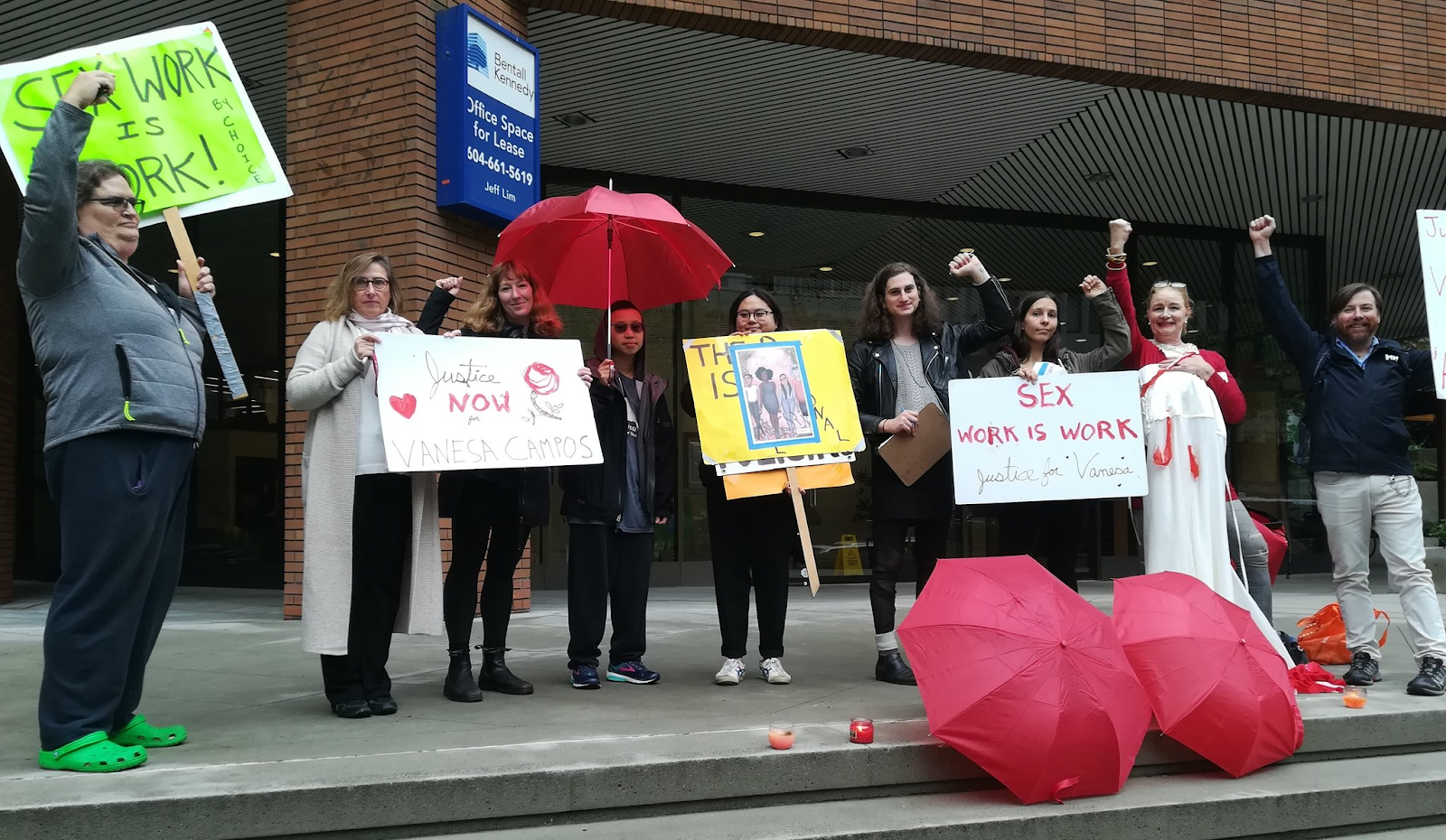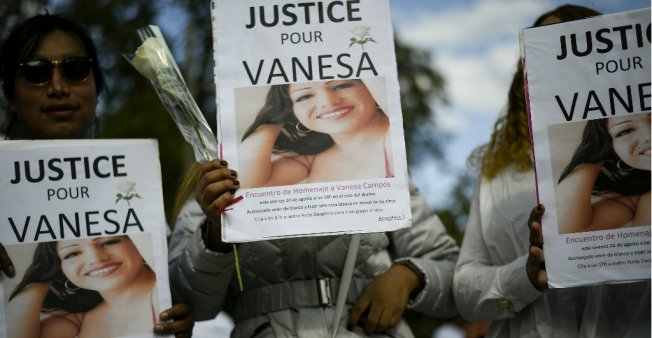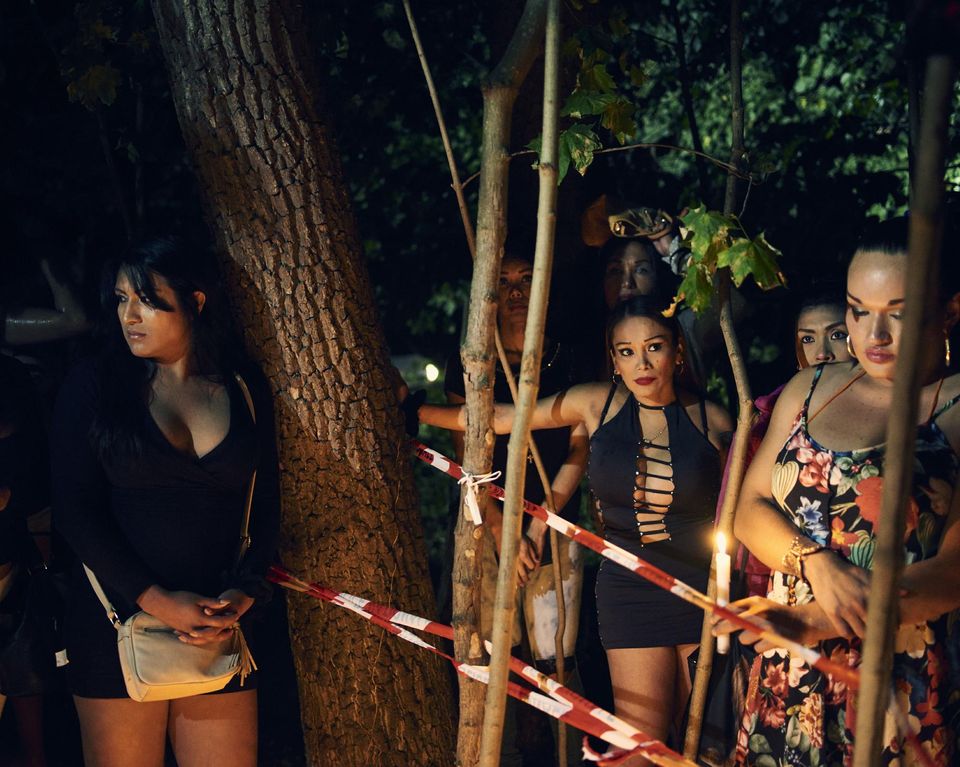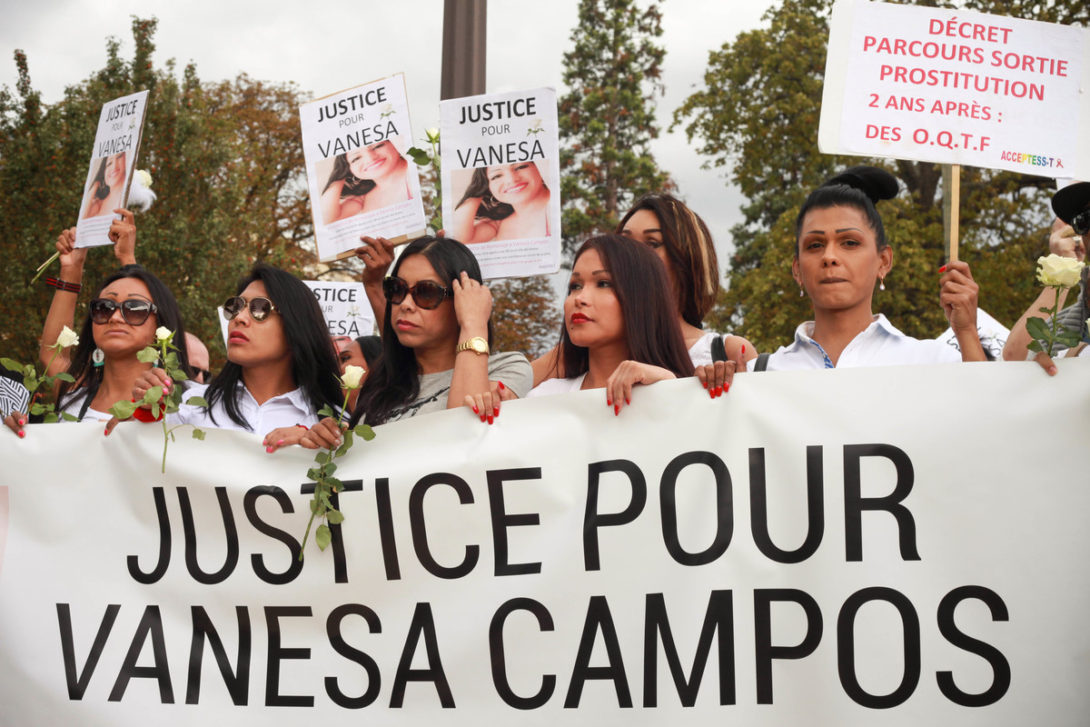

“We have inside us this strange impression that our dead do not arouse any emotion. For us, there is never national mourning. There is never an official commemoration. The political class remains silent. Once the sensationalist press articles are over, it’s the return to silence, and we have to go back to work with fear, waiting to be next.” – STRASS, Syndicat du Travail Sexuel, 2018
On August 16th, 2018, Vanesa Campos was murdered by five men. She was a migrant trans woman sex worker from Peru who had been living in Paris for two years. In response to her violent death, STRASS, a French union of sex workers, called an international day of action on September 21st to bring Vanesa’s story into the public eye and demand justice. As hundreds of people marched in the streets of Paris, rallies took place in Holland, Germany, Colombia, the United States, Australia, Portugal, Spain, England, and in Vancouver, where a vigil was called by STRASS organizer Christine Pompadour.
While Vanesa’s murder was committed by multiple men who were attempting to rob her client, her killing was not an isolated incident for immigrants, trans women, and sex workers. New French laws that forced Vanesa Campos and her co-workers to hide in the forest surrounding Paris in order to work left them more vulnerable to the violence of the police and stimulated anti-sex work sentiment amongst the French population. As Pompadour stated to the French Consul at the Vancouver vigil, “It has been two years since the law was passed, people come to attack and steal the girls, forcing them to work without condoms. The girls don’t feel safe going to the police, and it is getting worse.” Vanesa Campos’ life was crushed at the intersection of three sets of unjust laws and social norms – all of which take similar form in Canada: sex work prohibitionist laws that “criminalize demand”; border security laws that treat racialized migrant sex workers as “trafficking victims”; and anti-trans identity laws and gender power that increase trans women’s vulnerability to violence and health dangers. The struggle for justice for Vanesa Campos resonates for all trans women, migrants, and sex workers in France, and it should for us in Canada too.
“They arrest our clients, not our murderers”: The problem with criminalizing demand

In April 2016, France passed a law that criminalizes clients rather than workers, joining the global prohibitionist discourse around prostitution that systematically conflates sex work with trafficking, and paints sex workers as the victims of their clients or their pimps. Similar laws are in place in Canada, Sweden, Norway, and Iceland. Equating sex work with human trafficking reinforces the stigma around this form of labor. As early as 2013, STRASS was already shining a light on the negative ripple effects of such legislation. In an open letter, they wrote, “the criminalization of clients will not make prostitution disappear, but will increase sex workers’ precariousness by forcing them further underground and away from community health and support groups, health care facilities, screening and prevention. Isolated from each other, sex workers are more exposed to the risk of violence, exploitation, HIV/AIDS and STIs infections.” The letter continues, “sex workers should not be treated as minors without any capacity to consent, [which] promotes the stigma and practices of discrimination.” Criminalizing demand has not resulted in the abolition of sex work, but has increased the intensity of the gendered and racialized violence that sex workers experience.
France’s new sex work laws impact more harshly the poor, trans women, and migrant workers who work outside and who are more susceptible to violence. This is where Vanesa was working, in the woods of the Bois de Boulogne park. Since the law passed, the number of clients has gone down drastically because clients are afraid to risk fines. The clients left have more power to impose their demands, using the precarity of workers as an opportunity to bargain over services and price. Even though sex workers are not directly prosecuted, they are the most impacted by the criminalization of clients. As their clients face a fine of €1500 to €3750, the vulnerability of workers is multiplied: they have to hide from police, lose their power to screen clients, and could face eviction if they work at home as their landlord would fall under the law criminalizing brothels.
By focusing on “demand,” France’s anti-sex work laws cover up what actually perpetuates violence against sex workers. It is the police who harass sex workers with impunity, the lawmakers who prefer to rob clients instead of offering sanctuaries to workers, and the predators who use the lack of safe work spaces to attack workers. Behind the promise of combatting a “prostitutional system,” France only succeeds in degrading the safety, health, and material conditions of sex workers.
Sex Work is Not the Problem, Imperialism is the Problem
For migrants living in France, access to housing and work is precarious. According to France’s Central Office for the Repression of Human Trafficking, migrant women make up 80% of the sex worker population. This number gives insight into the population targeted and documented as sex workers by the police and the constant persecution they face on the streets, at work, and outside of their homes. Steel Roses, a collective of Chinese sex workers established in the Belleville neighbourhood of Paris in 2014, has been collecting and sharing stories of police violence. They describe how some of their co-workers do not have enough to eat because the constant presence of police officers – asking for their papers and taking pictures of them – keeps them from working.
The French police argue 90% of sex workers in France are victims of sex trafficking, while in neighbouring Germany the government estimates them to be less than 1%. Painting all migrant workers as victims creates a panic around human trafficking only to justify stricter border controls and anti-immigration laws. The exploitation of migrant women’s labour is a reality that cannot be addressed by criminalization. Migrant sex workers face racial profiling from police, who perform identification searches of women they believe to be sex workers. If they have no papers, they are arrested and face deportation. In December 2017, a raid by the police in the Bois de Boulogne embodied once again this state trafficking discourse after thirty sex workers were arrested in one night – all targeted because they were racialized migrants.
French Trans Antagonistic State Repression

Until 2016 in France, trans people had to produce proof of their sterility in order to gain state recognition of their lived gender. In May 2016, the government passed a new law called “21st Century Justice,” which was supposed to simplify the process of changing identity documents for trans people. But the process demands trans people present their case in front of a judge, leaving the power to change their identity documents in the hands of an arbitrary court decision. The court can also ask them to produce a statement from a “psychiatric expert.” This state policy works alongside trans antagonistic bigots, including TERFs (trans-exclusionary radical feminists), who continue to equate trans people – and trans femininity, especially – with mental illness.
Anti-sex worker stigma and repression orchestrated by the French government also impacts trans sex workers’ access to medical care. The risk of HIV exposure, for example, does not reside so much in sex work itself as in the conditions they are forced into by police harassment and fear of arrest. The famous slogan “cops everywhere, justice nowhere” describes this well, reminding us that while the cops are here to card, intimidate, and attack sex workers they have never been here to offer the smallest sense of protection or safety to these precarious workers – leaving them at the mercy of the vigilantes, rapists, and murderers who know all too well how their crimes against trans women will remain unpunished.
The French Government Finds an Ally in Canada, We Do Not
The reality for migrant women, working class trans women, and sex workers in Canada is the same. In Canada, sex work laws also criminalize demand. Only Vancouver’s “Sex Work Enforcement Policy Guidelines” tell police to deprioritize arresting sex work clients. Yet this City policy – fought for and won by decades of sex workers’ struggles in the context of a genocide against sex workers and Indigenous women in the Downtown Eastside (DTES) neighbourhood of Vancouver – does not protect sex workers from anti-sex work attitudes held by police and the public. As Laura Paul, an organizer of the Bread, Roses and Hormones campaign shares, police routinely arrest sex workers on circumstantial offenses and threaten their clients in the DTES. She recalls one cop telling a client, “you know what happens to guys like you down here don’t you? You disappear.” Sex workers, although not criminalized directly as “solicitors”, are regularly arrested on “drug trafficking” offenses – often meaning they were in possession of a personal supply – or for breach of bail or redzone conditions, which are legal problems that compound from an initial arrest. In Vancouver, 92% of the red zone conditions imposed by the court are concentrated in the DTES, thus blocking sex workers arrested while in possession of drugs from accessing their homes, food and harm-reduction services – all vital resources to their survival.

Vancouver’s City policy around sex work prioritizing workers’ safety and access to social support can also be revoked when they suspect human trafficking. As in France, the police will then use this narrative to enforce arrests and anti-immigration laws. In addition, it is illegal for sex workers to text each other about work safe practices, share a driver or client, or work out of the same space. Sex workers in Canada and France are forced into dangerous isolation and pitted against each other because they struggle over dates due to a decrease in demand. Canada’s moralist sex work abolition strategies don’t make life better for sex workers; they increase the exploitation women experience at and outside of work. These conditions are nearly identical with those that killed Vanesa Campos in Paris.
Justice for Vanesa!
At the solidarity vigil for Vanesa Campos held outside the French consulate in Vancouver, Annie, an organizer with Triple-X Workers’ Solidarity Association of BC, shared, “We are protesting today because the client law is criminalizing clients and forcing sex workers to go work in the forest where they are vulnerable and getting murdered. Vanesa Campos was shot to death by five men in the Bois de Boulogne and we think it is absolutely disgusting that migrant sex workers and all sex workers do not have a safe space to work. We are human beings, we are supporting our families and we are sick of all this bullshit.” Since her death, one of Vanesa’s co-workers has already been attacked in the Bois de Boulogne, in the same circumstances.
As Vanesa Campos joins the long list of women sex workers murdered by predators enabled by anti-sex work laws and cultural climates, we will fight to bring her justice. To repeal the law and decriminalize sex work is only a first step. We need to attack the systems that create and feed off poverty, which limit women’s economic options to survive; to destroy the imperialist laws and racist capitalist borders that leave no other solutions to people than to migrate to support themselves and their families; to fight the anti-trans identity laws and cis-supremacist society that discriminates against trans women; and to abolish the carceral system, including the cops who only exist to police and repress the poor and the racialized. Through the multitude of coalitions that rallied all over the world this September 21st, we see the forces of working-class trans women and migrants rising up to refuse the violence imposed on them, build spaces of resistance to flourish, and create the revolutionary labour movement we need, which recognizes sex workers’ workplace rights, trans liberation, and migrant justice as the interests of all.
